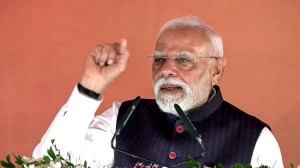Bowlers careful not to repeat mistakes
In going wicketless for the first time on home soil, the Indian bowling attack went through one of its most frustrating moments at the Eden ...

In going wicketless for the first time on home soil, the Indian bowling attack went through one of its most frustrating moments at the Eden Gardens where they lost the match to South Africa by ten wickets.
However, at the Wankhede, the Indians will be looking to restrain themselves from committing the same mistakes.
Ajit Agarkar and Rudra Pratap Singh — two bowlers who have been able to make optimum use of the placid tracks that were available in most of the matches against Sri Lanka and now against South Africa — are among the ones who were busy rectifying themselves at the nets on Sunday.
On a grassy wicket at Kolkata’s electrifying venue, South African pace did the Indian top-order in with Shaun Pollock topping the charts for the day. India were bowled out for a paltry 188 runs after being asked to bat first.
In reply, the Indian attack looked ineffective like never before through the last couple of series, letting the Safs reach the target in 35.5 overs without a wicket to their credit.
At the nets on the eve of the last match, Chappell spent quality time with his bowlers in trying to remind them of what had been so vividly taught in the three-day camp at Bangalore before the Sri Lankans arrived for the seven-match ODI series.
The Indian bowling, in Agarkar and RP’s opinion, had been successful on the slower tracks because of the new found ability ‘‘to maintain a restricted line and bowl straighter, cutting down on any side-movement of the wrists.’’
In Kolkata, India used the same attack that had held Graeme Smith and his men in the most spectacular fashion at the Chinnaswamy Stadium in Bangalore last week.
However, in the Kolkata game, none of the bowlers with the exception of Harbhajan Singh were either given a full quota of 10 overs or managed an economy rate less than four.
RP has time and again indicated the ‘‘increase in accuracy levels’’ that has been the criteria for bowlers learning under Chappell. His overall economy rate in the series so far was around 3.50, except for the Kolkata match where he was clobbered at around five runs per over.
Agarkar, who relies less on swing and more on accuracy, also failed to get things going for him, dishing out approximately seven runs per over at the Eden.
With little width on hand, the SA captain sent the Indians ducking for cover and that, says Agarkar: ‘‘will not be repeated in Mumbai.’’





- 01
- 02
- 03
- 04
- 05


























